The Chronic immune thrombocytopenia treatment Market is estimated to be valued at USD 2.3 billion in 2025 and is projected to reach USD 4.0 billion by 2035, registering a compound annual growth rate (CAGR) of 5.7% over the forecast period.
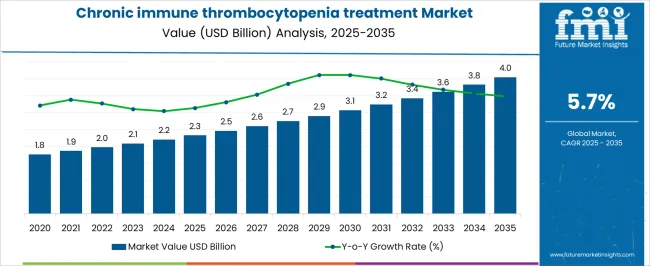
| Metric | Value |
|---|---|
| Chronic immune thrombocytopenia treatment Market Estimated Value in (2025 E) | USD 2.3 billion |
| Chronic immune thrombocytopenia treatment Market Forecast Value in (2035 F) | USD 4.0 billion |
| Forecast CAGR (2025 to 2035) | 5.7% |
The Chronic Immune Thrombocytopenia treatment market is witnessing steady growth driven by the rising prevalence of autoimmune disorders and increasing awareness of platelet-related disorders among healthcare providers and patients. The market is largely influenced by advances in immunotherapy, targeted drug development, and the introduction of next-generation therapeutics that improve patient outcomes while minimizing adverse effects.
Investment in healthcare infrastructure, improved diagnostic capabilities, and the growing focus on personalized treatment regimens are further enhancing market expansion. Additionally, the aging population and the increasing prevalence of comorbid conditions that complicate platelet management are driving the demand for effective therapies.
The ongoing evolution of treatment protocols, including combination therapies and newer immunomodulatory agents, is creating opportunities for improved clinical outcomes As hospitals and specialty clinics adopt advanced treatment strategies and clinical guidelines are updated to support evidence-based interventions, the market is poised for continued growth, providing patients with more accessible and effective treatment options over the coming decade.
The chronic immune thrombocytopenia treatment market is segmented by treatment type, end users, and geographic regions. By treatment type, chronic immune thrombocytopenia treatment market is divided into Drug Based Treatment, Fostamatinib Drugs, Romiplostim Drugs, Splenectomy Treatment, Other Treatment, Platelet Transfusions Treatment, and Treating Infections Treatment. In terms of end users, chronic immune thrombocytopenia treatment market is classified into Hospitals, Ambulatory Surgery Centre, Emergency Centre, and Others. Regionally, the chronic immune thrombocytopenia treatment industry is classified into North America, Latin America, Western Europe, Eastern Europe, Balkan & Baltic Countries, Russia & Belarus, Central Asia, East Asia, South Asia & Pacific, and the Middle East & Africa.
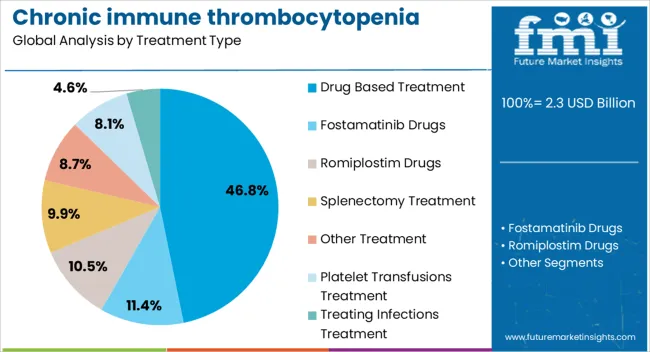
Drug based treatment is projected to hold 46.80% of the Chronic Immune Thrombocytopenia treatment market revenue share in 2025, making it the leading treatment type. This dominance is being attributed to the established efficacy of pharmacological interventions in managing platelet counts and reducing bleeding risk among patients.
The growth of this segment has been reinforced by the increasing availability of corticosteroids, thrombopoietin receptor agonists, and immunoglobulin therapies, which provide clinicians with flexible options for both first-line and chronic management of the condition. Treatment protocols have been optimized to reduce side effects while improving patient adherence, enhancing the attractiveness of drug-based therapies.
The ability to customize treatment regimens according to patient age, disease severity, and comorbidities has further supported market growth As research continues to identify new molecular targets and novel drugs, the drug-based treatment segment is expected to maintain its leadership position, driven by its proven clinical efficacy, scalability in hospital settings, and integration into standard care guidelines.
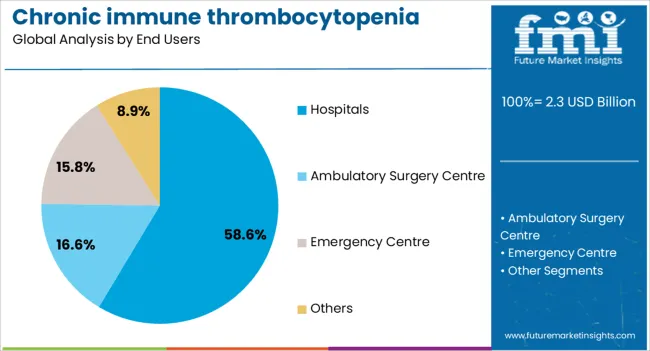
Hospitals are anticipated to account for 58.60% of the Chronic Immune Thrombocytopenia treatment market revenue in 2025, positioning them as the largest end-user segment. This leading position is being driven by the centralized availability of specialized hematology departments, advanced diagnostic facilities, and trained clinical staff capable of administering complex therapies.
Hospitals are preferred for initiating treatment, monitoring platelet counts, and managing complications, which necessitate close medical supervision. The segment has benefited from increased healthcare investments, the expansion of inpatient and outpatient services, and the adoption of treatment protocols aligned with international clinical guidelines.
The availability of advanced infusion centers and the integration of multidisciplinary care teams have further reinforced the preference for hospital-based treatment As the demand for specialized care grows and awareness of chronic immune thrombocytopenia increases, hospitals are expected to continue capturing the largest share of the market, supported by their ability to provide comprehensive, safe, and scalable treatment options for diverse patient populations.
The chronic immune thrombocytopenia treatment is the most important treatment for those patient which are suffering from bleeding problem, the blood clotting process get slow or did not occurs in patient due to which major health issue can affect the body. The process of blood clotting is controlled by platelets or thrombocytes, the deficiency of platelets or thrombocytes in blood affect the patient during surgery or any major or minor damage in which blood is come out of the body or any internal bleeding.
The platelets which is responsible for clotting is made in bone marrow along with other blood cells. The patient which are suffering from chronic immune thrombocytopenia is also known as purpura as the bruises appeared on skin. The small small bleeding spot are known as petechiae which resemble like a rash. The chronic immune thrombocytopenia which occurs mostly in adults and last more than 6 months but in some cases children also affect with chronic immune thrombocytopenia.
Women has more probability then men for getting affected with chronic immune thrombocytopenia. The treatment for chronic immune thrombocytopenia is based on the platelet count of individual patients and intensity of bleeding. The chronic immune thrombocytopenia treatment is done by medication, splenectomy and other methods which are much more effective than any other process of treatment.
The Chronic immune thrombocytopenia treatment market is expected to have significant growth, as the patient which suffer from chronic immune thrombocytopenia have to face many major health issue. The chronic immune thrombocytopenia treatment is necessary to protect the patient from blood loss during surgery or in any major or minor accident.
Chronic immune thrombocytopenia treatment provide healthy lifestyle to the patient which are suffering from chronic immune thrombocytopenia and allow them to have normal lifestyle. The lack of awareness for diagnosis of chronic immune thrombocytopenia and high cost of treatment for chronic immune thrombocytopenia is the current hindrances for the current market of chronic immune thrombocytopenia treatment.
Chronic immune thrombocytopenia treatment market is a growing market, as the demand for the treatment is increasing due to major health issue in patient. Research and development is going on at industry level to come up with various chronic immune thrombocytopenia treatment which can reduce patient problems. In recent year many drugs has been approved by various regulatory organization for providing better treatment in various geographical regions.
Geographically, the global chronic immune thrombocytopenia treatment market is segmented into North America, Latin America, Western Europe, Eastern Europe, Asia Pacific Excluding Japan, Japan, Middle East and Africa. North America show major market share for chronic immune thrombocytopenia treatment, as the major industries players are present with in the region.
The reimbursement scenario also boos the overall market of chronic immune thrombocytopenia treatment. Western and Eastern Europe show increasing growth rate for chronic immune thrombocytopenia treatment, as the adaptation for treatment rate is increasing within the region. Asia Pacific excluding Japan is expected to show sluggish growth due to low medical infrastructures in various countries and lack of proper distribution channel for product availability in the countries.
Japan is expected to have moderate growth due to steady growth of medical infrastructures and well management healthcare professional to handle chronic immune thrombocytopenia treatment. Middle East and Africa is expected to have slow growth due to lack of awareness among healthcare professional and under develop medical infrastructures in various countries.
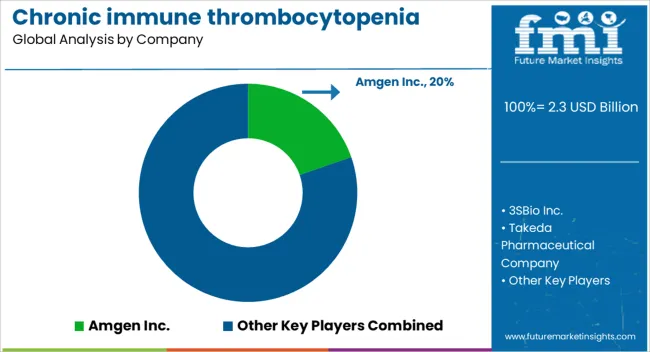
Examples of some of the key players operating in the chronic immune thrombocytopenia treatment market are Rigel Pharmaceuticals, Inc., Amgen Inc., PROTALEX, INC. among others.
The research report presents a comprehensive assessment of the market and contains thoughtful insights, facts, historical data, and statistically supported and industry-validated market data. It also contains projections using a suitable set of assumptions and methodologies. The research report provides analysis and information according to categories such as market segments, geographies, types, technology and applications.
The report is a compilation of first-hand information, qualitative and quantitative assessment by industry analysts, inputs from industry experts and industry participants across the value chain. The report provides in-depth analysis of parent market trends, macro-economic indicators and governing factors along with market attractiveness as per segments. The report also maps the qualitative impact of various market factors on market segments and geographies.
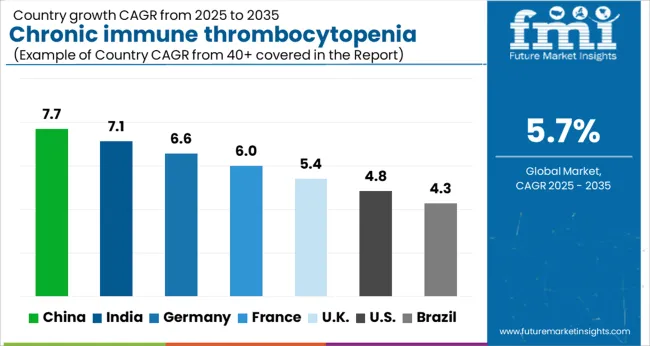
| Country | CAGR |
|---|---|
| China | 7.7% |
| India | 7.1% |
| Germany | 6.6% |
| France | 6.0% |
| UK | 5.4% |
| USA | 4.8% |
| Brazil | 4.3% |
The Chronic immune thrombocytopenia treatment Market is expected to register a CAGR of 5.7% during the forecast period, exhibiting varied country level momentum. China leads with the highest CAGR of 7.7%, followed by India at 7.1%. Developed markets such as Germany, France, and the UK continue to expand steadily, while the USA is likely to grow at consistent rates. Brazil posts the lowest CAGR at 4.3%, yet still underscores a broadly positive trajectory for the global Chronic immune thrombocytopenia treatment Market. In 2024, Germany held a dominant revenue in the Western Europe market and is expected to grow with a CAGR of 6.6%. The USA Chronic immune thrombocytopenia treatment Market is estimated to be valued at USD 853.9 million in 2025 and is anticipated to reach a valuation of USD 1.4 billion by 2035. Sales are projected to rise at a CAGR of 4.8% over the forecast period between 2025 and 2035. While Japan and South Korea markets are estimated to be valued at USD 123.1 million and USD 74.2 million respectively in 2025.
| Item | Value |
|---|---|
| Quantitative Units | USD 2.3 Billion |
| Treatment Type | Drug Based Treatment, Fostamatinib Drugs, Romiplostim Drugs, Splenectomy Treatment, Other Treatment, Platelet Transfusions Treatment, and Treating Infections Treatment |
| End Users | Hospitals, Ambulatory Surgery Centre, Emergency Centre, and Others |
| Regions Covered | North America, Europe, Asia-Pacific, Latin America, Middle East & Africa |
| Country Covered | United States, Canada, Germany, France, United Kingdom, China, Japan, India, Brazil, South Africa |
| Key Companies Profiled | Amgen Inc., 3SBio Inc., Takeda Pharmaceutical Company, Bayer AG, Boehringer Ingelheim GmbH, Bristol-Myers Squibb Company, Eisai Co., Ltd., Hansa Medical AB, Intas Pharmaceuticals Ltd., and Merck & Co. Inc. |
The global chronic immune thrombocytopenia treatment market is estimated to be valued at USD 2.3 billion in 2025.
The market size for the chronic immune thrombocytopenia treatment market is projected to reach USD 4.0 billion by 2035.
The chronic immune thrombocytopenia treatment market is expected to grow at a 5.7% CAGR between 2025 and 2035.
The key product types in chronic immune thrombocytopenia treatment market are drug based treatment, fostamatinib drugs, romiplostim drugs, splenectomy treatment, other treatment, platelet transfusions treatment and treating infections treatment.
In terms of end users, hospitals segment to command 58.6% share in the chronic immune thrombocytopenia treatment market in 2025.






Our Research Products

The "Full Research Suite" delivers actionable market intel, deep dives on markets or technologies, so clients act faster, cut risk, and unlock growth.

The Leaderboard benchmarks and ranks top vendors, classifying them as Established Leaders, Leading Challengers, or Disruptors & Challengers.

Locates where complements amplify value and substitutes erode it, forecasting net impact by horizon

We deliver granular, decision-grade intel: market sizing, 5-year forecasts, pricing, adoption, usage, revenue, and operational KPIs—plus competitor tracking, regulation, and value chains—across 60 countries broadly.

Spot the shifts before they hit your P&L. We track inflection points, adoption curves, pricing moves, and ecosystem plays to show where demand is heading, why it is changing, and what to do next across high-growth markets and disruptive tech

Real-time reads of user behavior. We track shifting priorities, perceptions of today’s and next-gen services, and provider experience, then pace how fast tech moves from trial to adoption, blending buyer, consumer, and channel inputs with social signals (#WhySwitch, #UX).

Partner with our analyst team to build a custom report designed around your business priorities. From analysing market trends to assessing competitors or crafting bespoke datasets, we tailor insights to your needs.
Supplier Intelligence
Discovery & Profiling
Capacity & Footprint
Performance & Risk
Compliance & Governance
Commercial Readiness
Who Supplies Whom
Scorecards & Shortlists
Playbooks & Docs
Category Intelligence
Definition & Scope
Demand & Use Cases
Cost Drivers
Market Structure
Supply Chain Map
Trade & Policy
Operating Norms
Deliverables
Buyer Intelligence
Account Basics
Spend & Scope
Procurement Model
Vendor Requirements
Terms & Policies
Entry Strategy
Pain Points & Triggers
Outputs
Pricing Analysis
Benchmarks
Trends
Should-Cost
Indexation
Landed Cost
Commercial Terms
Deliverables
Brand Analysis
Positioning & Value Prop
Share & Presence
Customer Evidence
Go-to-Market
Digital & Reputation
Compliance & Trust
KPIs & Gaps
Outputs
Full Research Suite comprises of:
Market outlook & trends analysis
Interviews & case studies
Strategic recommendations
Vendor profiles & capabilities analysis
5-year forecasts
8 regions and 60+ country-level data splits
Market segment data splits
12 months of continuous data updates
DELIVERED AS:
PDF EXCEL ONLINE
Thrombocytopenia Treatment Market Growth - Innovations & Future Trends 2025 to 2035
Chronic Refractory Cough Treatment Market – Growth & Innovations 2025 to 2035
Chronic Venous Occlusions Treatment Market Size and Share Forecast Outlook 2025 to 2035
Chronic Respiratory Diseases Treatment Market
Chronic Smell and Flavor Loss Treatment Market – Innovations & Growth 2025 to 2035
Chronic Pulmonary Hypertension Treatment Market Analysis and Forecast by Drug Type, Route of Administration, Distribution Channel, Region through 2035
Warm Autoimmune Hemolytic Anemia (WAIHA) Treatment Market Analysis by Drug Class, Distribution Channel, and Region through 2035
Heparin-Induced Thrombocytopenia (HIT) Treatment Market - Trends & Forecast 2025 to 2035
Chronic Sarcoidosis Therapeutics Market Size and Share Forecast Outlook 2025 to 2035
Chronic Phase Markers Market Size and Share Forecast Outlook 2025 to 2035
Chronic Lymphocytic Leukemia Therapeutics Market Size and Share Forecast Outlook 2025 to 2035
Chronic Lymphocytic Leukemia Market Size and Share Forecast Outlook 2025 to 2035
Chronic Dryness Repair Market Analysis - Size and Share Forecast Outlook 2025 to 2035
Chronic Skin Redness Care Market Size and Share Forecast Outlook 2025 to 2035
Chronic Hepatitis B Virus Testing Market Size and Share Forecast Outlook 2025 to 2035
Treatment-Resistant Hypertension Management Market Size and Share Forecast Outlook 2025 to 2035
Treatment-Resistant Depression Treatment Market Size and Share Forecast Outlook 2025 to 2035
The Chronic Wound Care Market is segmented by product, wound type and distribution channel from 2025 to 2035
Chronic Disease Management Market Size and Share Forecast Outlook 2025 to 2035
Chronic Brain Damage Treatment: Trends, Growth, and Key Developments

Thank you!
You will receive an email from our Business Development Manager. Please be sure to check your SPAM/JUNK folder too.
Chat With
MaRIA